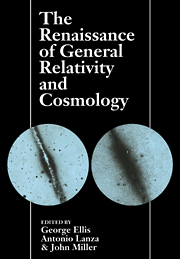 The Renaissance of General Relativity and Cosmology
The Renaissance of General Relativity and Cosmology Book contents
- Frontmatter
- Contents
- Author Addresses
- 1 Introduction
- 2 Exact and inexact solutions of the Einstein field equations
- 3 Inertial forces in general relativity
- 4 Relativistic radiation hydrodynamics: a covariant theory of flux-limiters
- 5 Relativistic gravitational collapse
- 6 The cosmic censorship hypothesis
- 7 The Kerr metric: a gateway to the roots of gravity?
- 8 Galactic astronomy since 1950
- 9 Galaxy distribution functions
- 10 Nonlinear galaxy clustering
- 11 Quasars: progress and prospects
- 12 Decaying neutrinos in astronomy and cosmology
- 13 Cosmological principles
- 14 Anisotropic and inhomogeneous cosmologies
- 15 Mach's principle and isotropic singularities
- 16 Implications of superconductivity in cosmic string theory
- 17 The formation and evaporation of primordial black holes
- 18 Evaporation of two dimensional black holes
- 19 Topology and topology change in general relativity
- 20 Decoherence of the cluttered quantum vacuum
- 21 Quantum non-locality and complex reality
- 22 The different levels of connections between science and objective reality
2 - Exact and inexact solutions of the Einstein field equations
Published online by Cambridge University Press: 15 December 2009
- Frontmatter
- Contents
- Author Addresses
- 1 Introduction
- 2 Exact and inexact solutions of the Einstein field equations
- 3 Inertial forces in general relativity
- 4 Relativistic radiation hydrodynamics: a covariant theory of flux-limiters
- 5 Relativistic gravitational collapse
- 6 The cosmic censorship hypothesis
- 7 The Kerr metric: a gateway to the roots of gravity?
- 8 Galactic astronomy since 1950
- 9 Galaxy distribution functions
- 10 Nonlinear galaxy clustering
- 11 Quasars: progress and prospects
- 12 Decaying neutrinos in astronomy and cosmology
- 13 Cosmological principles
- 14 Anisotropic and inhomogeneous cosmologies
- 15 Mach's principle and isotropic singularities
- 16 Implications of superconductivity in cosmic string theory
- 17 The formation and evaporation of primordial black holes
- 18 Evaporation of two dimensional black holes
- 19 Topology and topology change in general relativity
- 20 Decoherence of the cluttered quantum vacuum
- 21 Quantum non-locality and complex reality
- 22 The different levels of connections between science and objective reality
Summary
INTRODUCTION
There has been a tremendous growth in the understanding of General Relativity and of its relation to experiment in the past 30 years, resulting in its transformation from a subject in the doldrums on the periphery of theoretical physics, to a subject with a considerable experimental wing and and many recognised major theoretical achievements to its credit. The main areas of development have been,
* solar system tests of gravitational theories,
* gravitational radiation theory and detectors,
* black holes and gravitational collapse,
* cosmology and the dynamics of the early universe.
On the theoretical side, this development is based on understanding exact and inexact solutions of the Field Equations (the latter has three different meanings I will discuss later). In this brief review of theoretical developments, there is not space to give full references to all the original papers. Detailed references can be found in previous surveys, in particular ‘HE’ is Hawking and Ellis (1973), ‘TCE’ is Tipler Clarke and Ellis (1980), ‘HI’ is Hawking and Israel (1987), and ‘GR13’ is the proceedings of the 13th International meeting on General Relativity and Gravitation held in Cordoba, Argentina in 1992. Many of the issues raised here are considered at greater length elsewhere in this book, e.g. in the articles by MacCallum and Tod.
- Type
- Chapter
- Information
- The Renaissance of General Relativity and CosmologyA Survey to Celebrate the 65th Birthday of Dennis Sciama, pp. 20 - 39Publisher: Cambridge University PressPrint publication year: 1993
- 14
- Cited by


